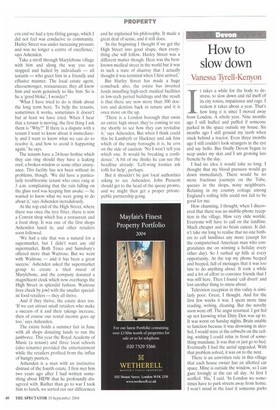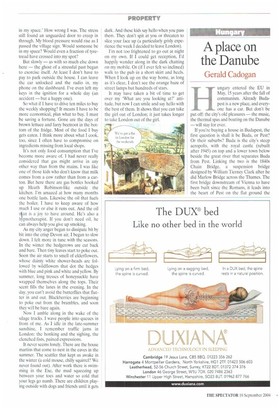How to slow down
Vanessa Tyrell-Kenyon
It takes a while for the body to destress, to slow down and rid itself of its city toxins, impatience and rage. I reckon it takes about a year. That's
how long it is since I moved away from London. A whole year. Nine months ago I still huffed and puffed if someone parked in the space outside my house. Six months ago I still ground my teeth when stuck behind a tractor. Even three months ago I still couldn't look strangers in the eye and say hello. But finally Devon began to seep under my skin and I am growing less frenetic by the day.
I had no idea it would take so long. I thought that my blood pressure would go down immediately. There would be no more fractious journeys on the Tube, queues in the shops, noisy neighbours. Relaxing in my country cottage among England's rolling hills could not fail to be good for me.
How charming, I thought, when I discovered that there was no mobile-phone reception in the village. How very oide worlde. Everyone will have to call on the landline. Much cheaper and no brain cancer. It didn't take me long to realise that no one bothers to call landlines any more (except for the computerised American man who congratulates me on winning a holiday every other day). So I rushed up hills at every opportunity. At the top my phone beeped and beeped, full of messages that it was too late to do anything about. It took a while and a lot of effort to convince friends that I was still here. Then I found 'call divert' and lost another thing to stress about.
Television reception in this valley is similarly poor. Great, I thought. And for the first few weeks it was. I spent more time reading, writing, cleaning. But the novelty soon wore off. The angst returned. I got fed up not knowing what Dirty Den was up to. It was worst on Sunday nights. Brain unable to function because it was drowning in alcohol, I would stare at the cobwebs on the ceiling, wishing I could relax in front of something mundane. It was that or just go to bed. Eventually I had the aerial upgraded. With that problem solved, it was on to the next.
There is an unwritten rule in this village that each house owner has an allotted car space. Mine is outside the window, so I can gaze lovingly at the car all day. At first I scoffed. 'Ha,' I said. 'In London we sometimes have to park streets away from home. I won't mind in the least if someone parks in ray space.' How wrong I was. The stress still found an unguarded door to creep in through. My blood pressure would rise as I passed the village sign. Would someone be in my space? Would even a fraction of tyretread have crossed into my spot?
But slowly — as with so much else down here — the ghost of a stressful past began to exorcise itself. At least I don't have to pay to park outside the house. I can leave the car unlocked and the radio in, my phone on the dashboard. I've even left my keys in the ignition for a whole day (an accident — but a happy one).
So what if I have to drive ten miles to buy the weekly shopping? It means I have to be more economical, plan what to buy. I must be saving a fortune. Gone are the days of brown lettuce and furry beetroot in the bottom of the fridge. Most of the food I buy gets eaten. I think more about what I cook, too, since I often have to compromise on ingredients missing from local shops.
It's not only food consumption that I've become more aware of. I had never really considered that gas might arrive in any other way than from the mains. I was like one of those kids who don't know that milk comes from a cow rather than from a carton. But here there are gas bottles hooked up Heath Robinson-like outside the kitchen. I'm amazed at how many months one bottle lasts. Likewise the oil that fuels the boiler. I have to keep aware of how much I use or else it runs out. Arid the oil n an is a joy to have around. He's also a ht pnotherapist. If you don't need oil, he can always help you give up smoking.
As my city anger began to dissipate bit by bit into the crisp Devon air, I began to slow down. I felt more in tune with the seasons. In the winter the hedgerows are cut back and bare. Then tiny leaves start to poke out. Soon the air starts to smell of elderflowers, whose dainty white shower-heads are followed by wildflowers that dot the hedges with blue and pink and white and yellow. By summer, long tresses of honeysuckle have wrapped themselves along the tops. Their scent fills the lanes in the evening. In the day, you can't avoid the butterflies that flutter in and out. Blackberries are beginning to poke out from the brambles, and soon they will be bare again.
Now I amble along in the wake of the silage trucks. I wave people into queues in front of me. As I idle in the late-summer sunshine, I remember traffic jams in London: the honking and the sighing, the clenched fists, pained expressions.
It never seems lonely. There are the house martins that come to nest in the eaves in the summer. The scuttler that kept us awake in the winter (a cold mouse, chilly squirrel? We never found out). After work there is swimming in the Exe, the mud squeezing up between your toes and water so cold that your legs go numb. There are children playing outside with dogs and friends until it gets dark. And these kids say hello when you pass them. They don't spit at you or threaten to slice your face up (a particularly grisly experience the week I decided to leave London).
I'm not too frightened to go out at night on my own, If I could get reception, I'd happily wander along in the dark chatting on my mobile. Or (if I ever felt so inclined) walk to the pub in a short skirt and heels. When I look up on the way home, as long as it's clear, I don't see the orange haze of street lamps but hundreds of stars.
It may have taken a bit of time to get over my 'What are you looking at?' attitude, but now I can smile and say hello with the best of them. It shows that you can take the girl out of London; it just takes longer to take London out of the girl.



















































































 Previous page
Previous page